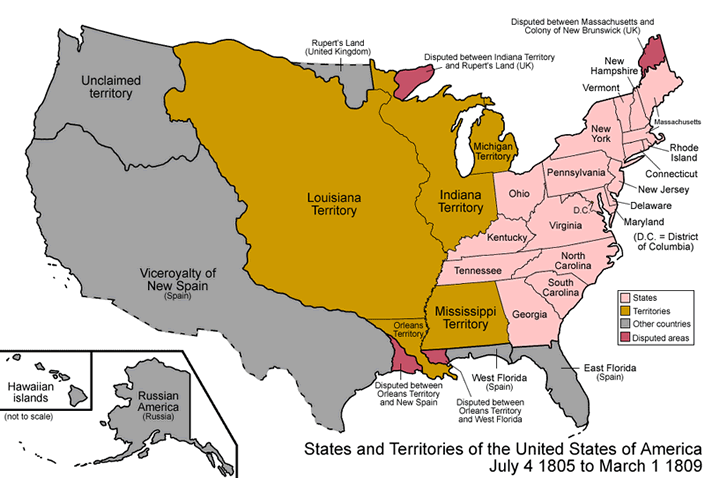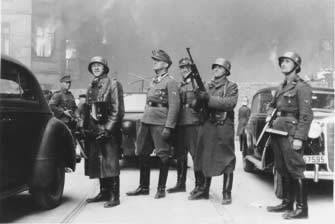This Week in History:
April 24-30, 1803
The Louisiana Purchase
April 2011
In this column, we look back to certain events in United States history, from the standpoint of arousing the memory of the American people to the historical principles which we followed at our best. Our focus on the Franklin Roosevelt years speaks to the fact that this was the last period of perceived crisis in our nation's history, in which the principles of the American System were applied, and we shall return to that period again over the coming weeks. Last week's column on the Warsaw Ghetto Uprising, represented a special exception, particularly appropriate because of the recent crimes by the Sharon government in Israel.
This week we go back further in the history of the United States, to commemorate an event which indeed shaped the prospects of our nation. That is the Louisiana Purchase, the huge land deal between France and the United States, which was signed on April 30, 1803. The purchase of this vast expanse, more than 800,000 square miles, put the young nation well on its way to becoming the continental republic which the republican founding fathers dreamed of its becoming.
As EIR has previously documented, founders such as John Winthrop, Alexander Hamilton, and John Quincy Adams, and their collaborators, were committed from the nation's beginning, to the creation of a republic "from sea to shining sea."* This was a matter of moral commitment, and security, for those who had come to these shores. In 1629, Massachusetts Bay Colony Governor Winthrop issued a call for developing the North American continent for the benefit of mankind:
"The whole earth is the Lord's garden & he hath given it to the sons of men, with a general condition, Gen: 1.28. Increase and multiply, replenish the earth and subdue it, which was again renewed to Noah. The end is double, moral and natural, that man might enjoy the fruits of the earth and God might have his due glory from the creature. Why then should we stand here striving for places of habitation ... and in the meantime suffer a whole Continent, as fruitful and convenient for the use of man, to lie waste without any improvement."
Once the American colonies had been forced into a revolutionary war against Great Britain in order to be able to pursue this goal, the imperative for continent-wide expansion became increasingly a military matter. The new nation was surrounded from the south, west, and north by hostile, and warring, powers: Spain to the south and west; France to the north and west; and Great Britain to the north, and by sea. By simply leaving circumstances status quo, the young United States could be virtually certain of moves by these imperial powers against its own territorial integrity, and survival.
John Quincy Adams, the statesman of the early 19th century who did the most to craft our foreign policy on the basis of the republican concept of the Community of Principle, had a very good idea of what would happen if the United States were not expanded continentally. He put it this way in a letter to his mother in 1811, in which he laid out the stakes if the Federalist Party of New England, then pushing secession, were not defeated:
"Instead of a nation coextensive with the North American continent, destined by God and nature to be the most populous and most powerful people ever combined under one social compact, we shall have an endless multitude of little insignificant clans and tribes at eternal war with one another for a rock, or a fish pond, the sport and fable of European masters and oppressors."
It was the threat represented by wars among the Europe powers that actually permitted President Thomas Jefferson to purchase the Louisiana Territories. France's Napoleon Bonaparte had taken over the huge territories from Spain in 1800, and Spain, which still controlled New Orleans, cut off the United States from shipping rights in the port. At the same time, Napoleon planned major military operations on the continent, but had to take into consideration his prospects against the British on the European continent.
Jefferson moved accordingly to offer to purchase the Territories, using emissaries James Monroe and Robert Livingston. The deal doubled the official territory of the United States, at a cost of about $11 million. There was a catch, however; could the United States hold on to the land? Napoleon, it seems, was betting it couldn't.
But Jefferson's first battle was a fight for support in the Congress. Here he encountered implacable opposition from the Federalist Party, which was at that point virtually controlled by the Tory faction. But, joining the President were the principled nationalists Alexander Hamilton, John Adams, Rufus King, and John Quincy Adams himself, then a Federalist Senator in the process of breaking with the traitors running his party. The funding for the purchase, and arrangements for governing the huge territories, were eventually passed. When followed up by John Quincy Adams' actions as Secretary of State under President Monroe, the United States was well on its way to becoming the continental republic which John Winthrop had envisioned.
—Nancy Spannaus
*For more material on the content and history of the United States' fight to become a continental republic, see EIR, Jan. 28, 2000, Vol. 27, No. 4.
April 19, 1943: On the Anniversary of the Warsaw Ghetto Uprising
We reprint here a statement issued April 19, 2002 by Nancy Spannaus, author of EIW's THIS WEEK IN HISTORY feature and the editor-in-chief of New Federalist newspaper; she was then a candidate for the U.S. Senate from Virginia, and it was in that capacity that she released this statement.
* * *
|
Fifty-nine years ago, Nazi Maj. Gen. Jürgen Stroop (third from left) ran the extermination of stood, in that degree, the principle of the Jewish resistance in the Warsaw Ghetto—just as Israel’s Ariel Sharon is doing today against the Palestinian camps. |
Today, April 19, those who cherish the noble fight for human dignity throughout history, commemorate the beginning of the Warsaw Ghetto Uprising in 1943. Just as the Nazi Waffen-SS moved into the Warsaw Ghetto to liquidate the 56,000 Jews who had survived their two-and-a-half-year campaign of starvation, deportations, and assassinations, a dedicated core of Jewish youth launched a fierce resistance. Knowing that the Nazis planned to liquidate them all, they determined to give their lives in all-out battle, a battle that could serve as an inspiration to those who would live on to fight for justice for all peoples.
Four weeks later, when Waffen-SS Commander Juergen Stroop could finally report to Adolf Hitler, "The Warsaw Ghetto is no more," those Jewish fighters had changed history. Their lives, and deaths, had sanctified European Jewry and all mankind, because, by standing up as heroes against hopeless odds, they had given purpose to both their lives and their deaths.
|
The ambulance, destroyed by Israeli forces’ rockets, in which the head of the Palestinian health service of the West Bank city of Jenin was killed while trying to save lives. “Genocide by denial of medical care,” named in the Nuremberg codes, is one of the war crimes being committed by the IDF throughout the West Bank. |
|
The UN Food and Agriculture Organization said “a major catastrophe is under way” due to the incredible kllling and destruction wrought by the Israeli Defense Forces in Jenin and other refugee camps. They now lack water, food, sanitation, and electricity—but IDF forces are blocking relief efforts. |
Fifty-nine years later, we face the horror of the repetition of the Warsaw Ghetto policy, this time in the Israeli-occupied areas of Palestine. The Israeli Defense Force is moving on the West Bank, and especially, the refugee camps, such as the now virtually liquidated Jenin. For this purpose, they have used tactics copied directly from their studies of the Nazi reports on the methods used against the Warsaw Ghetto: Starvation, isolation, denial of medical care, targetted and indiscriminate shootings, and finally, the mowing down of building after building by use of heavy artillery and fire, against civilians and resisters alike. These are the Israeli government's faithful imitations of Nazi methods, methods which the world now sees displayed across its TV screens and newspapers.
This fact has been documented without doubt by humanitarian agencies, journalists, many Israelis, and the victims themselves.
The Palestinian youth, like the Jewish youth in Warsaw decades ago, also decided to put up a heroic resistance. Like the Jewish fighters of the Warsaw Ghetto, they responded to their families being butchered. They too, facing overwhelming force, launched what would appear to be a hopeless struggle, in order to save their dignity, and inspire future generations to defeat forces like those Nazis in Warsaw. The two-week battle of Jenin was, thus, the Warsaw Ghetto uprising of the Palestinians.
The Israeli-Palestinian crisis did not have to come to this. It was the need to prevent a continued escalation of such seemingly endless attack and retaliation, murder and revenge, the constant bloodletting, which led Israeli Prime Minister Yitzhak Rabin to conclude the Oslo Accords with Palestinian President Yasser Arafat, in 1993. Rabin, an Israeli general, hardened in wars with the Palestinians, finally understood, in that degree, the principle of the Treaty of Westphalia, by which warring parties must choose, at some point, to put aside their grudges, and collaborate for a future beneficial to both. The only real war-winning strategy is a strategy, not for exterminating the enemy, but improving both his, and our own, situation in life.
Former Israeli statesman Abba Eban expressed the crucial point in an article on the Oslo Accords in September 1993. He wrote: "The fact that these 1.8 million people [the Palestinian population] have neither the human rights of Israeli citizens, nor the ability to establish a separate political identity, violates our nation's democratic structure. It is a society in which Palestinians have nothing to lose, and Israelis have nothing to gain. That is why we have both agreed to disengage from it.... To prefer the previous situation to the current one would be to prefer war and death to peace and life."
Eban was expressing the need for an axiomatic change in the Israeli leadership. Yet, clearly, there was not a consensus in Israel for the perspective of Rabin, or Eban. The Nov. 4, 1995 assassination of the peace-making Prime Minister, by a protected asset of the Israeli intelligence services, was the turning-point leading to the present horrors. From that moment forward, the political will of Israel to carry out the Oslo Accords has been thrown into doubt, and that nation thrown onto the track we now see: Nazi-like extermination, or expulsion, of a subject population. Chronicling that downward spiral is beyond the scope of this statement.
But we do know, that the spirit of resistance to these Nazi-like policies is still alive within Israel. More than 420 Israeli Army Reservists have put their futures on the line by refusing to deploy in the Occupied Territories, insisting that they will not act to "dominate, expel, starve, and humiliate an entire people." (See www.seruv.org.) Thousands more have come out to demonstrate against the occupation, and to openly condemn the actions of the "butcher" Prime Minister Ariel Sharon. Many more Israelis have come to realize that the punishment-and-retaliation strategy of Sharon and the IDF, like that of the Nazis, will ultimately lead to their own destruction.
What is our response to this from the United States? We used to say, "Never again!" We used to say, that we would never let Nazi war crimes happen here. Now, it's happening there! Worse, the United States, the biggest backer of Sharon and former Prime Minister Bemjamin Netanyahu, is encouraging it to happen.
It's time that we, too, like Prime Minister Rabin, examined our axioms. Why are we willing to tolerate such Nazi-like horrors? Why do we permit our politicians to put the blame on the victims of such horrors? What kind of world have we created over the past 50 years, where a holocaust against any people can be tolerated by those who once prided themselves upon defeating Nazism? Is it that we now consider some classes of human beings less than human, just as the Nazis did?
On this anniversary of the Warsaw Ghetto Uprising, it's past time for us to examine the purpose of our own lives. As they found purpose in their sacrifice, we may find it in the battle to stop these Nazi-like atrocities, and finally establish the basis, in economic development and dialogue, for a true and lasting Middle East peace.
—Nancy Spannaus
The original article was published in the EIR Online’s Electronic Intelligence Weekly, as part of an ongoing series on history, with a special emphasis on American history. We are reprinting and updating these articles now to assist our readers in understanding of the American System of Economy.




